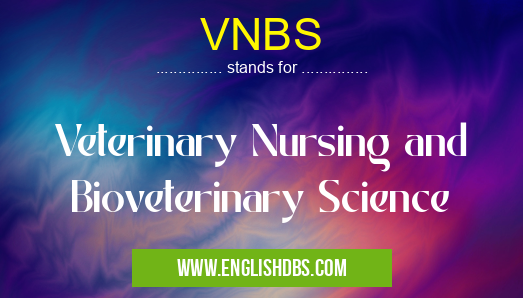What does VNBS mean in NURSING
Veterinary Nursing and Bioveterinary Science (VNBS) is an interdisciplinary field which consists of both Veterinary Nursing (VN) and Bioveterinary Science (BVS). VNBS provides the skills, knowledge and training necessary to provide quality care of animals, particularly in veterinary settings. It blends the scientific principles of biomedicine with the holistic approach of nursing to promote optimal animal health. VNBS professionals are knowledgeable in a range of basic science concepts, as well as maintaining a compassionate, non-judgmental attitude toward their patients.

VNBS meaning in Nursing in Medical
VNBS mostly used in an acronym Nursing in Category Medical that means Veterinary Nursing and Bioveterinary Science
Shorthand: VNBS,
Full Form: Veterinary Nursing and Bioveterinary Science
For more information of "Veterinary Nursing and Bioveterinary Science", see the section below.
What is Veterinary Nursing?
Veterinary Nursing is a specialized form of nursing involving the care and treatment of animals. This includes providing medical care and treatments prescribed by veterinarians; monitoring, caring for, and rehabilitating animal patients; general cleaning, feeding and housing duties; providing information on pet care; and performing administrative tasks associated with the practice. VNs must remain up-to-date on medical advances that may benefit their patients, maintain current certification and licensure through continuing education programs, keep accurate records of treatment and medications administered to their patients, and observe and report any changes in an animal's physical condition.
What is Bioveterinary Science?
Bioveterinary Science (BVS) focuses on understanding the biological processes that underpin both normal physiology in animals and altered physiological states which occur during disease or injury. BVS encompasses many branches such as immunology, genetics, nutritional science, pharmacology, pathology medicine amongst others to understand the complexity between an animal's body systems. This understanding enables practitioners to better diagnose diseases early on, treating them more efficiently before any further complications can occur.
The Role Of Veterinary Nursing & Bioveterinary Science
The combination of Veterinary Nursing & Bioveterinary Sciences combines two distinct specialist fields into one to provide a truly unique skill set that can be used to benefit all types of animals from companion pets to livestock animals. VNB Professionals have the ability to monitor an animal's health over an extended period of time due to their extensive knowledge base which helps them detect subtle changes in their patient's behaviour or responses long before they become apparent through traditional tests or examinations. BVS Practitioners can use this information along with bespoke protocols developed via research findings with specific species or breeds leading to improved diagnostics which enable effective targeting towards individual health issues instead of replacing conventional approaches such as prescribing drugs or administering treatments without knowing what underlying issue causes them first.
Essential Questions and Answers on Veterinary Nursing and Bioveterinary Science in "MEDICAL»NURSING"
What is Veterinary Nursing and Bioveterinary Science?
Veterinary Nursing and Bioveterinary Science (VNBS) is a field of study that focuses on caring for animals and improving their welfare. VNBS covers the areas of animal science, veterinary medicine, nursing care, nutrition, anatomy, physiology and behaviour. It also involves providing medical services such as diagnostics, pet care management and clinical laboratory techniques.
What qualifications are needed to work in Veterinary Nursing and Bioveterinary Science?
Veterinary Nurses must complete an accredited qualification in order to become qualified practitioners. This may include either a Bachelor's degree or Master's degree in Veterinary Nursing or Bioveterinary Science. Additionally, some states may require certification from relevant professional organisations such as the American Board of Veterinary Specialties (ABVS).
What kind of tasks does a Veterinary Nurse perform?
As part of their job, a Veterinary Nurse performs many different tasks including examining patients, administering treatments and medications prescribed by a veterinarian, providing nursing care for animals during illness or injury, conducting tests to diagnose illnesses or injuries and educating clients on proper animal care practices.
What kind of environment do Vet Nurses typically work in?
Veterinary Nurses are typically employed by clinics, hospitals or research facilities which may involve working with small or large animals. The environment they work in can be outdoors if working with livestock or pets that need to be examined outside the clinic. Alternatively they might work indoors at an office environment where most treatments are performed inside a hospital or clinic setting.
What are the hours like for working in VNBS?
Working hours as a Vet Nurse can vary depending on the type of facility they are employed at. Some clinics may provide 24 hour support with shifts lasting anywhere from 8-10 hours while others have more organised business hours during typical weekdays and weekends off for rest.
What kind of career advancement opportunities exist within VNBS?
Experienced veterinary nurses may have the opportunity to progress into more specialised roles such as research assistant positions or advance further into senior positions leading teams at larger practices. Additionally there are opportunities available to pursue higher qualifications such as Masters degrees which can open up even more career paths within this field.
Are there any specialized areas within VNBS?
Yes! There are several specialized areas within VNBS including anesthesia technicians/nurses who specialize in administering anesthesia prior to surgeries; large animal veterinarians who focus on livestock health; small animal veterinarians who primarily focus on household pets; ophthalmology nurses who specialize in eye diseases; radiology nurses specialize in X-Rays; internal medicine specialists focusing on diagnosis & treatment of infectious diseases; zoo Veterinarians who specialize in exotic species health; nutritionists focusing on animal dietetics; etc
Final Words:
In conclusion Veternary Nursing & Bioveterinary Sciences is a pioneering field which not only allows for cost efficient management but also enables greater insight into individualised patient needs - improving outcomes whilst reducing risk factors associated either internally via lifestyle management or externally via environment control measures suitable for each species/breed type. By combining these two distinct specialist fields together practitioners can develop advanced strategies tailored specifically for improve both preventative long term healthcare while tackling specific issues quickly when needed — benefitting both clinicians themselves as well as enhancing quality patient care.
